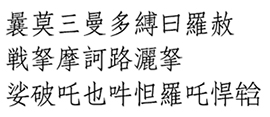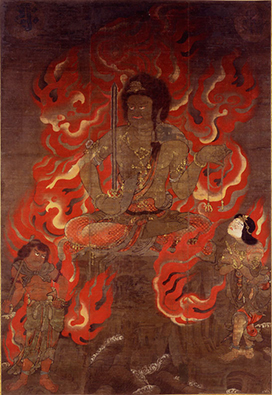The Story of “Opera AOI”
The chapter “Aoi” is from the famous work of Japanese literature “Genji monogatari” (The Tale of Genji) that is sometimes called the world’s first novel and has been arranged in a contemporary style.
It depicts the strange things which happen to Aoi, a star singer who closely works with Hikaru, a popular musical composer. One day Aoi’s manager receives a call that Aoi has been involved in an accident and hurries up to the hospital. What she sees in Aoi’s patient room is a psychiatrist, and Aoi apparently possessed by the spirit of Midori. Midori is a VOCALOID character who had once taken the world by storm but had then been forgotten by Hikaru and the world.
Is she really possessed by Midori or is it Aoi herself tormented by her conflicting mind?
* The word “Midori” can mean Green(緑) or Blue(碧) in Japanese.
Comparison Between the Original Work and This Opera
| Hikaru Genji, the beautiful and wise second prince of the emperor desired by all the noble women. | Hikaru, a young man who composes "Jikushu" (The Mantra of Compassion), a VOCALOID song based on the Mantra of Fudō-myōō. The song sweeps the world, and he becomes a star composer. |
| Aoi no Ue, Hikaru Genji's legal wife. Bedridden with illness. | Aoi. Enamored with the VOCALOID Midori, she sings "Jikushu," which leads to her working together with Hikaru. Hospitalized after a traffic accident. |
| Storyteller (an Emperor's courtier) | Aoi's manager. |
| Rokujo no Miyasudokoro, Hikaru Genji's former lover. She becomes a vengeful spirit at night and torments Aoi. | A VOCALOID named Midori. Her voice suddenly comes from Aoi as she is in her sickbed. |
| Teruhi no Miko. The shrine maiden called by the courtier to discover the cause of Aoi's illness, she discovers that it is Rokujo no Miyasudokoro's vengeful spirit. | A psychiatrist who psychoanalyzes Aoi. |
| Yokawa no Kohijiri, an exorcist called by the courtier to quell the vengeful spirit. | A record of Midori's singing "Jikushu" is played back. |
| "Jikushu," the Mantra of Fudō-myōō. | A technopop song previously composed by Hikaru based on the original "Jikushu." |
"Jikushu," the Mantra of Fudō-myōō.
A mantra recited in prayer toward Fudō-myōō, one of the major Buddhist deities said to be the avatar of Dainichi Nyorai (Vairocana). While there are various theories regarding this, here is one representation of it in Japanese kanji, as well as a pronunciation guide and an explanation of its meaning.

namaH samanta vajraaNaaM
caNDamahaaroSaNa
phoTaya huuM traT haaM maaM

Oh Fudō-myōō, who shows his fierce rage.
Use your great anger to smash my hindrances,
remove my obstacles,
and fulfill my wish to attain Buddhahood.

